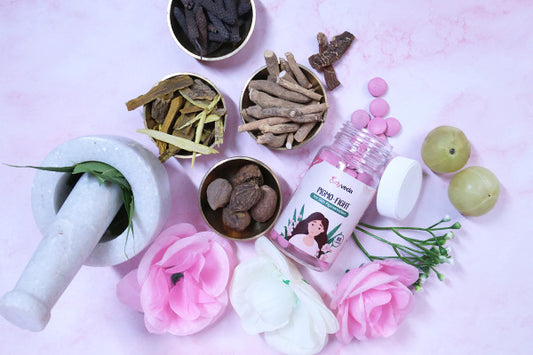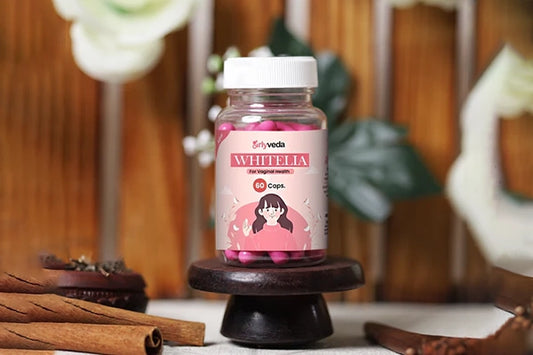Effective Ayurvedic Treatment for PCOS: Diet, Remedies & Herbs

Understanding PCOS in Ayurveda
Signs and Symptoms of PCOS
- Irregular or skipping menstrual cycle
- Excess hair growth on face, chest, or buttocks
- Acne or oily skin
- Unexplained weight gain and difficulty in losing it.
- Infertility
- Hair loss (pattern baldness)
- Mood swings
Ayurvedic Treatment for PCOS
Key Ayurvedic Use of Herbs for PCOS Treatment
- Ashwagandha
According to a 2016 study by NIH, Ashwagandha helps reduce cortisol level to manage chronic stress and PCOS symptoms.
- Kachnar
This herb is a valuable ingredient in Ayurveda that is popular for its ability to balance hormones and support healthy glandular functions. It’s especially helpful for women with PCOS, irregular periods, or sluggish metabolism.
- Shatavari
It is also Known as the “queen of herbs” in Ayurveda, Shatavari helps regulate estrogen levels, supports ovulation, and improves fertility in women with PCOS.
- Dhamsa Patti
Traditionally used to purify the blood and remove toxins (ama), Dhamsa Patti supports hormonal balance and soothes inflammation in the reproductive system.
- Siras Beej
This lesser-known Ayurvedic seed promotes ovarian health, supports regular menstrual cycles, and helps reduce cyst formation associated with PCOS.
Ayurvedic therapies for PCOS
Panchakarma Therapy
This is a deep detox treatment in Ayurveda that removes toxins (ama) and balances the doshas. For PCOS, therapies like Virechana (cleansing through purgation), Basti (medicated enema), and Nasya (nasal therapy) are especially helpful in regulating hormones and cleansing the reproductive system.
Abhyanga (Oil Massage)
A warm herbal oil massage done daily or weekly helps improve blood circulation, reduce stress, and stimulate the lymphatic system. It’s calming, grounding, and great for managing the anxiety and hormonal imbalances that often come with PCOS.
Shirodhara
This relaxing therapy involves pouring a continuous stream of warm oil on the forehead. It deeply relaxes the nervous system, reduces cortisol levels, and supports hormonal harmony—ideal for women with PCOS who deal with stress and sleep issues.
Udvartana (Herbal Powder Massage)
A dry massage using herbal powders that helps reduce Kapha, improve metabolism, and support weight loss. It’s especially effective for women with PCOS struggling with stubborn fat, insulin resistance, and water retention.
Swedana (Herbal Steam Therapy)
This steam therapy opens up the body’s channels, flushes out toxins, and improves overall circulation. It helps reduce bloating, clear reproductive blockages, and enhances the benefits of other Ayurvedic treatments.
Ayurvedic diet for PCOS

What to Eat in Ayurvedic diet for PCOS (Your Hormone-Friendly Plate)
- Warm, cooked meals: Ayurveda loves warm, freshly prepared food. Think vegetable khichdi, moong dal soup, or steamed sabzi. These are easier to digest and support your Agni (digestive fire), which is often weak in PCOS.
- Whole grains: Stick to lighter grains like barley (jau), quinoa, and millets (like ragi or bajra). These help balance Kapha and support better metabolism.
- Fresh fruits and veggies: Go for seasonal produce—especially bitter and astringent veggies like karela (bitter gourd), lauki (bottle gourd), and leafy greens. Fruits like papaya, pomegranate, and berries are great too.
- Healthy fats: Ghee (yes, in moderation!), coconut oil, and soaked nuts like almonds and walnuts support hormone production and keep your skin glowing.
- Spices that heal: Cinnamon, turmeric, cumin, and fenugreek (methi) are all amazing for PCOS. They help reduce insulin resistance, boost digestion, and calm inflammation.
- Herbal teas: Sip on tulsi, ginger, or cinnamon tea instead of caffeinated drinks. They’re soothing and hormone-friendly.
What to Avoid in PCOS Ayurvedic diet (A Gentle No List)
- Dairy and refined sugar: Too much milk, paneer, cheese, or sugar can mess with your hormones. Switch to plant-based alternatives and try jaggery or dates if you need something sweet.
- Fried and oily food: Yes, those samosas and fries might comfort you short-term, but they increase inflammation and block the channels in your body—especially important if you have cysts.
- White flour and polished rice: Maida, white bread, and refined carbs spike blood sugar and insulin—exactly what you don’t want with PCOS.
- Excess caffeine: Too much tea or coffee can mess with your cortisol (stress hormone), which in turn throws your hormones off balance. Go easy on it!
Home Remedies for PCOS
- Methi Seeds (Fenugreek Magic): Soak 1 teaspoon of fenugreek seeds in water overnight. In the morning, drink the water and chew the seeds on an empty stomach. It helps regulate insulin, balance hormones, and manage weight.
- Lemon + Warm Water: Start your day with warm water and fresh lemon juice. It gently detoxifies the system, boosts metabolism, and supports healthy digestion—something PCOS often disrupts.
- Cinnamon Tea: Boil a small cinnamon stick in water for 5–7 minutes and sip it like tea. Cinnamon improves insulin sensitivity and helps regulate blood sugar levels, both key in PCOS management.
- Raw Garlic: Crush 1 clove of raw garlic and swallow it with water in the morning. It helps reduce inflammation and supports hormonal balance.
- Yoga & Pranayama: Practice gentle yoga poses like Bhujangasana (cobra pose), Malasana (squat pose), and Setu Bandhasana (bridge pose) for pelvic circulation. Add Pranayama (like Anulom Vilom) to calm the mind and support hormonal balance.












Thoughts on "Effective Ayurvedic Treatment for PCOS: Diet, Remedies & Herbs"